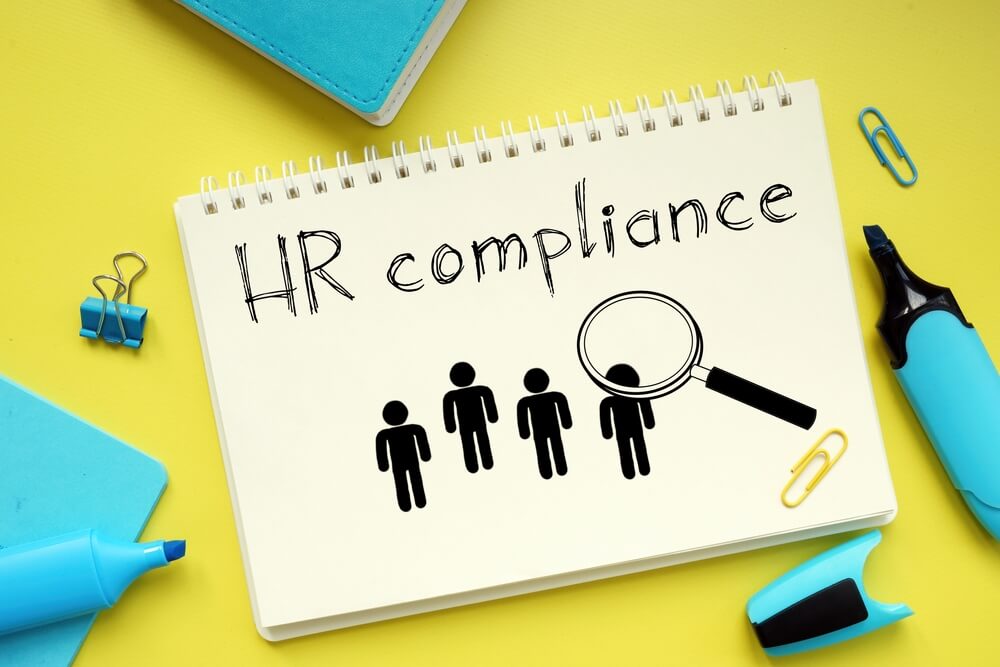The EaseBlog: Compliance

California Laws that Impact HR
As a business owner, navigating California's labyrinth of regulations is crucial to ensure you comply with California's strict employment and labor laws. It's not just about following the rules—it's about creating a safe and fair workplace for your team.
In this post, we'll review California's HR laws and offer insight into what regulations businesses are subject to so you can keep your company in good standing.
New California Laws That Affect HR
As of the first day of 2024, several laws went into effect that had significant implications for California's HR landscape.
These new laws include:
- Minimum Wage Increases: The minimum wage has jumped to $16. However, healthcare workers will have a minimum wage of $23 starting in June and $20 for fast food workers.
- Paid Sick Leave Entitlement: Employees now have the right to 40 hours of paid sick leave, providing more flexibility to those dealing with health issues.
- Reproductive Loss Leave Protections: New protections have been implemented for those taking reproductive loss leave, offering support during deeply personal circumstances.
- Discrimination Due to Cannabis Use Prohibited: Employers cannot discriminate against workers for recreational cannabis use outside working hours and not at their workplace.
- Further Restrictions on Noncompete Agreements: The state has tightened the regulations on noncompete agreements, reinforcing the rights of employees to change jobs freely.
These new laws underscore California's ongoing commitment to maintaining a fair and inclusive work environment.
Longstanding California Laws Impacting HR
California has a long history of implementing laws that protect workers. Understanding these foundations of California's HR laws will help you maintain a compliant, respectful, and fair workplace – which can also protect your business from incurring fines or PAGA claims.
Here are some key regulations that businesses must keep in mind and navigate.
Workplace Health and Safety (OSHA)
California's Occupational Safety and Health Act (OSHA) mandates every business to maintain a safe and healthful workplace for its employees. Employers are required by law to maintain an injury-prevention program that instructs safe practices and upholds guidelines.
Additional safe workplace requirements include smoking restrictions, weapons possession, and mandated safe driving prohibiting handheld cell phone use.
Pay and Benefits
California state laws outline pay and benefits requirements aimed at creating an equitable environment for their employees. They mandate that businesses provide disability insurance, enact health care continuation, and inform employees about pay frequency and deductions.
These laws aim to establish transparency with company pay and benefits policies.
Fair Employment Practices
California's Fair Employment and Housing Act is designed to create an inclusive and respectful workplace where everyone's rights are protected.
Discrimination of employees due to race, religion, disability, gender/sex, sexual orientation, age, and pregnancy, among other factors, is strictly prohibited. That includes requirements for equal pay, allowance for discussing wages, and access to personnel files. Companies must also provide reasonable accommodation for pregnancy, religion, and disability.
Furthermore, whistleblower protections are also written into this law to protect against retaliation.
Recruitment and Hiring
California has specific laws around recruitment and hiring to protect employee privacy, which HR teams must navigate.
Salary
Companies are restricted from asking about salary history and cannot rely on it to justify salary differences.
Drug Testing
Drug testing is allowed in California, but employees must receive proper notice. As noted above, employers cannot discriminate due to cannabis use.
Credit Checks
Credit checks can be performed only for certain positions (for example, if they serve the public interest, like law enforcement). Candidates must receive proper notice the credit check will be performed, and the employer must notify them if it affects their employment.
Criminal Checks
Companies with more than five employees cannot include a question on job applications inquiring about criminal history or make any inquiry until a conditional offer has been made. Employers must show business necessity before conducting a criminal check, but certain findings are prohibited from affecting hiring decisions. These include:
- Arrests, but the person was not convicted
- Pre- or post-trial diversion programs
- Sealed, expunged, or eliminated by statute convictions
- Juvenile court arrests or detentions
- Nonfelony marijuana possession convictions that are 2+ years old
Wage, Overtime, and Break Requirements:
As mentioned above, California's minimum wage requirements have changed in 2024.
- California's general minimum wage is $16
- Starting in June 2024, healthcare workers will have a $23 minimum wage that will increase by $1 every two years until it reaches $25
- Starting in April 2024, a $20 minimum wage will be in effect for fast food workers.
California law mandates overtime payment for hours worked beyond the 40-hour workweek and for those who work a seventh consecutive day. Nonexempt employees will receive time-and-a-half on overtime and double-pay for hours worked over 12 in any day.
Nonexempt employees are entitled to a 10-minute rest break for each four-hour period and an at-least 30-minute meal break for days worked over 5 hours.
Employers must also allow ample breaks to accommodate breastfeeding requirements, though these must coincide with existing breaks if possible and cannot disrupt the employer's operations. The employer must provide a room to allow privacy.
Proper Understanding of California's HR Laws Leads to Proper Adherence
Falling short of compliance risks businesses their reputation, talent, and, in extreme cases, their entire business. Employees and the general public are increasingly vigilant about workers' rights and corporate responsibility.
Failing to adhere to these laws can lead to costly PAGA claims, a tarnished brand image, and difficulty attracting and retaining top talent. Moreover, it undermines your employees' trust and morale, which could harm productivity and your bottom line.
While that may sound intimidating, businesses have recourse to keep up with these regulations. PEOs are regulatory experts who keep up with regulations and can guide businesses in developing best practices to maintain compliance and adhere to HR regulations.
Blog Categories
- PEO (21)
- Employees & Culture (13)
- Risk Management (8)
- HR Outsourcing (7)
- Human Resources (6)
- Workers' Comp (6)
- Compliance (5)
- Payroll (5)
- PAGA (4)
- Benefits (3)
- Flexible Spending Account (3)
- Podcasts (3)
- Diversity (2)
- HR technology (2)
- Training (2)
- ASO (1)
- Healthcare Savings Account (1)
- Inclusion (1)
- Legal Updates (1)
- PTO (1)
- SB 553 (1)
- Special Districts (1)
- recruiters (1)
- staffing (1)
Subscribe Here!
Let us help streamline the way you manage HR.

Subscribe for our the latest news and legal updates that will affect your business.
Newsletter Sign Up
Contact Us
Get in touch with us today.




